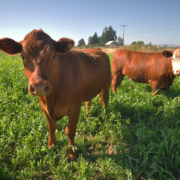New Zealand Pursuing Options for Reducing Methane Emissions from Agriculture
Almost half of New Zealand’s greenhouse gas emissions come from agriculture, reports a BBC feature, with methane making up 43% of the total, and 85% of that coming from the country’s 10 million cows and 26 million sheep. The country has pledged to cut its methane emissions and is pursuing several ways to achieve that by addressing livestock methane production. Although feed additives have shown promising results, they aren’t practical for pasture-based production, so researchers are also exploring developing technology such as vaccines and gene editing. Adjusting management practices could also contribute to reducing methane, though it’s unlikely to deliver the scale of reduction the country is seeking. One of the most promising options could be selecting for breeding animals that are lower emitters. Research is demonstrating that this strategy can be practiced on farms using portable testing equipment, and that it leads to steady methane-emissions reductions in successive generations of cattle and sheep without negative effects on production or animal health.

 USDA
USDA NRCS
NRCS USDA Photo by Lance Cheung.
USDA Photo by Lance Cheung.